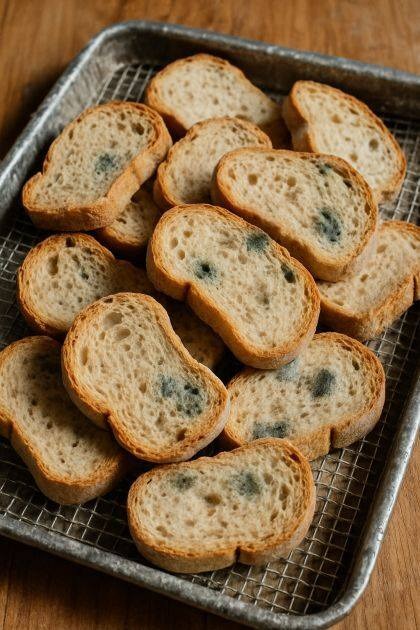Not much.
Stale bread retains most of its carbs, fiber, and nutrients, especially if it’s whole grain or fortified. The biggest difference is texture—not nutritional value. Just be aware that added nutrients (in enriched bread) may slightly decline over time.
🧊 Storage Tips to Keep Bread Fresher Longer
. Want to keep your bread fresh? Avoid the fridge—it speeds up staling. Instead:
Store in a bread box or paper bag at room temperature
For long-term storage, freeze it: wrap tightly and place in a freezer-safe bag. Thaw at room temperature or toast straight from the freezer.
⚠️ When to Let It Go
Even with the best intentions, some bread is too far gone. Toss it if:
You see mold anywhere (even a small patch)
It smells off or has an odd taste
It’s rock hard or feels like it could chip a tooth
Better safe than sorry!
🌍 How Cultures View Bread Waste Differently
Around the world, stale bread is seen in very different lights. In Europe, many traditional dishes like French pain perdu (French toast) or Italian panzanella (bread salad) make use of old bread. These time-honored recipes prove that good food doesn’t need to be fresh to be delicious.Soup recipes
Elsewhere, the preference for ultra-fresh food can lead to perfectly edible bread being discarded. Understanding these cultural contrasts can inspire us to think differently about our own food habits.
👨🍳 What Chefs Say About Stale Bread
For many chefs, stale bread isn’t a problem—it’s an ingredient. Culinary leaders like Chef Massimo Bottura have built entire dishes around using stale bread and other leftovers to promote zero-waste cooking.
Their creativity shows how leftovers can become luxury with the right mindset—and a little imagination.
🤔 Final Thoughts: Use It or Lose It?
When deciding whether to use stale bread, consider three things:
Is it safe? (No mold or off smells?)
Can you make it tasty?
What’s the environmental impact?
ADVERTISEMENT

